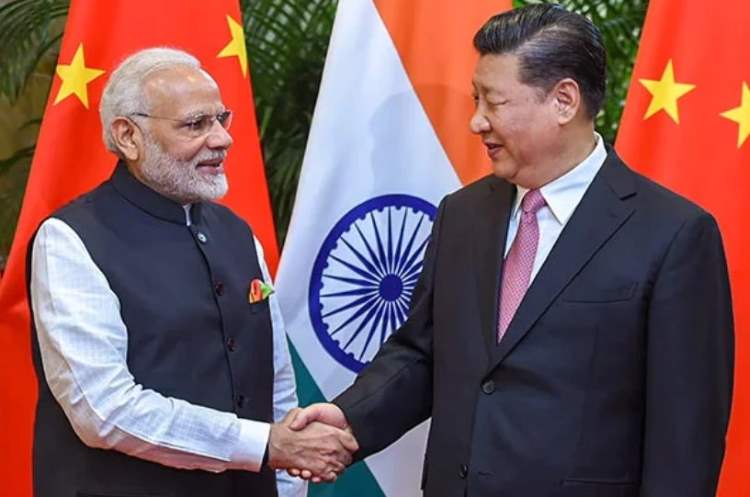
India’s geopolitical moment: We are at an inflection point in history where a very significant power shift is taking place. There is a view among international relations theorists that when a rising power reaches the level of about 80% of the economic, military and technological capabilities of the number one power, a significant power shift becomes inevitable. There is no way you can avoid it, and this is why I said we are at an inflection point.
The rising China is already beyond that 80% of the US in terms of economic, military and technological power. The rising power which looks to displace the existing superpower will obviously like to hasten that displacement by allying itself with those powers which can buttress its path. That is the logic behind the China-Russia relationship. That is why that relationship is so important and significant.
Naturally, the power which is threatened to be displaced will want to prevent that from happening and will also be looking for partners, allies in that process. The Indo-US relationship falls into that category. Of course, the US has many other partners. Now this is something which is being characterised as a coalition of democracies.
READ I ‘World looking at India’s G20 presidency with hope’
Rise of Chinese power
As a rather cynical practitioner of foreign policy, I would say that the impending power shift is at the core of the strategic expediency. It has nothing to do with ideology. Being democracies does not ensure strategic convergence. We have seen that through our own history. But being democracies can certainly reinforce strategic convergence, which is also something that characterises Indo-US relations.
There are premature expectations of a China Peak. Some people expect that its economic, military, and technological capabilities are plateauing at current levels. In PPP terms, China has already overtaken the United States of America. An $18 trillion economy in nominal terms, China will be adding another India every couple of years even if it is growing at 2-3%.
So, let us not fool ourselves as to the level of asymmetry between India and China. So, the China challenge for India is here to stay and the sooner we acknowledge that and deal with it, the better it is for us. Now, this does not mean that India has to acquiesce to Chinese dominance. India is the only country that can catch up with China in terms of population, military and technological heft. That’s the good news that we have.
India has already become more populous than China and will have a much younger population in the next several decades. We are actually witnessing a technological leap in India and that’s the other part of the good story. It is actually monumental in technological terms. There are gaps here and there, but the technological leap frogging is certainly very much apparent in terms of our digital economy.
READ I G20 Presidency: No headway in resolving deepening debt crisis
India’s geopolitical moment
Former CEO of Google Eric Smith was in India a couple of years ago. He made a statement which many people thought was an exaggeration. He said India is in the threshold of a Cambrian explosion. The Cambrian explosion is the event when approximately 541 million organisms emerged and saw a massive growth. His point was that India today is really at the threshold of that Cambrian explosion in terms of its ability to use technology to completely transform itself. He said no other country is at that point.
The components of that Cambrian explosion are Aadhar and internet connectivity at rates unmatched anywhere in the world. Today you have more people in India connected to the internet through smartphones than perhaps anywhere else in the world and the numbers are still growing. He talked about financial technology — the recent developments in UPI. He had a positive outlook with regard to India’s potential.
What is the geopolitical moment for India at this point of time? Take a leaf out of China’s book. In 1972, US President Richard Nixon visited China. What was that particular geopolitical moment? Unlike today when China and Russia are talking about no limit partnership, they were actually sort of sharp adversaries. The United States reached out to China in order to deal with what it saw as the greatest security threat at that time, the Soviet Union.
What did China do? It utilised that requirement on the part of the US for an ally against the Soviet Union to really become like a sponge, absorbing technology, capital, and knowledge from all over the world. The 40-year sprint that you saw from 1970s is a result of leveraging that geopolitical moment to completely transform itself.
Today, still the knowledge capitals of the world are the US, Japan, and Europe. That has not changed even if they are in relative decline. You have today very close partnerships with all these countries because they know that India is the only country which can give them a countervailing power against China. So, they have a stake in India’s success. They have a stake in building up India’s power. The diplomatic challenge for India is how to leverage that and transform itself. This is India’s geopolitical moment. I hope that the G20 presidency is leveraged to bring about that change.
(Ambassador Shyam Saran is a former Foreign Secretary to the Government of India. He has also served as Indian envoy to Myanmar, Indonesia and Nepal. This article is the edited transcript of Ambassador Saran’s speech at an event organised by Policy Circle.)
